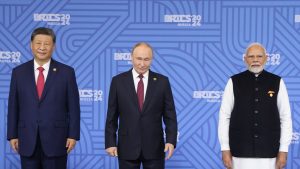Key Takeaways
- Oil prices surged over 5% following US sanctions on Russia’s largest oil companies
- Rosneft and Lukoil targeted for funding Russia’s war in Ukraine
- China and India face pressure to find alternative oil suppliers
- Companies given until November 21 to comply with sanctions
Global oil markets experienced significant volatility as Brent crude and West Texas Intermediate both jumped over 5% on Thursday. The surge came in response to the Trump administration imposing sweeping sanctions on Russia’s two largest oil producers, Rosneft and Lukoil, over their role in financing Moscow’s military operations in Ukraine.
Sanctions Target Kremlin’s War Funding
The US Treasury Department announced the measures on Wednesday, directly targeting companies that provide substantial financial support to Russia’s war effort. Treasury Secretary Scott Bessent stated, “Given President Putin’s refusal to end this senseless war, Treasury is sanctioning Russia’s two largest oil companies that fund the Kremlin’s war machine.” He urged allied nations to join the sanctions regime.
Russian oil and gas revenues have declined 21% year-over-year but still constitute approximately one-fourth of the federal budget. This makes energy exports the government’s most critical source of war funding. However, analysts note that Russia’s revenue structure, which relies more on production taxes than export taxes, might reduce the immediate financial impact.
International Reactions
Ukrainian President Volodymyr Zelenskyy welcomed the sanctions as “very important” while emphasizing that additional pressure would be necessary to achieve a ceasefire agreement.
Russian officials downplayed the measures, with a Foreign Ministry spokeswoman claiming Moscow has developed “strong immunity” to international sanctions. Meanwhile, Lukoil responded by canceling a scheduled board meeting concerning dividend payments, citing “the new circumstances.”
Major Buyers Forced to Adjust
The sanctions present immediate challenges for China and India, Russia’s largest oil customers. According to Saxo Bank analyst Ole Hansen, refineries in both nations must now secure alternative suppliers to avoid exclusion from Western financial systems.
The Trump administration has established a November 21 deadline for companies to cease transactions with the sanctioned Russian energy giants.
Industry sources indicate both Indian and Chinese refiners are taking swift action. Indian refiners plan to “sharply curtail” Russian oil imports to comply with US requirements, while major Chinese state enterprises including PetroChina, Sinopec, CNOOC and Zhenhua Oil will temporarily halt purchases of Russian seaborne crude.






